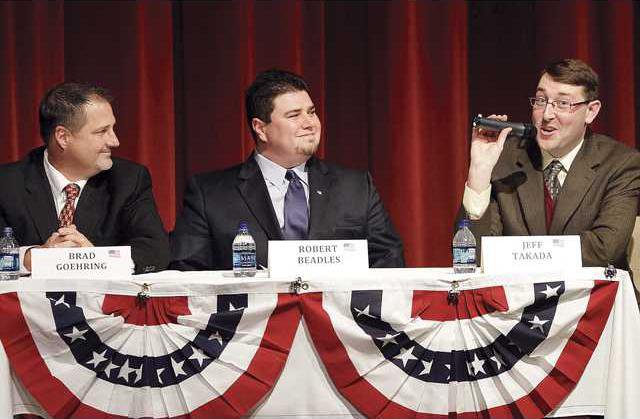The six candidates hoping to unseat two-time Democratic incumbent Jerry McNerney from his 11th congressional seat made their case to Manteca’s Republican voters.
On Monday night the South San Joaquin Republicans welcomed Brad Goehring, Elizabeth Emken, Jeff Takada, Robert Beadles, Tony Amador, and David Harmer to their first debate of 2010 at Crossroads Grace Community Church. It gave each of the six congressional hopefuls the chance to introduce themselves and their stance on the issues facing America today.
Despite a long road and fierce competition between now and June’s primary, Monday’s event remained civil among the six hopefuls for the majority of evening. It even provided some comic relief as the six looking to bring the seat back to the Republican-leaning 11th District voiced their opinions on everything from cap and trade to abortion.
“I think we have enough public officials in Washington, D.C. – it’s about time we had some public servants,” longtime Manteca resident Jeff Takada said in his opening statement. “That’s what I want to bring back to Washington, D.C., when I represent the voters of the 11th congressional district.”
Lodi resident Robert Beadles – who has been public about being on welfare and having to survive on food stamps – talked openly about what it took to rise above government assistance and become self-sufficient.
“I know what it feels like to have the weight of the world on your shoulders,” Beadles said. “And I know what it took to pick myself up and move forward.”
The majority of the candidates were in agreement on the questions that were read to them by South San Joaquin Republican founder and President Frank Aquila. He asked questions that touched on topics that were picked by himself, the individual candidates, and people in the community who submitted inquiries that were drawn at random.
“I respect the candidates that are up here, but we need to start talking about the primary,” Goehring said. “I’ve had a lot of endorsements for my campaign, and what that spells out is support – community support for my campaign.
“The question we have to ask ourselves is ‘Who can take out Jerry?’ Who has the clout and the muscle to do that? There is only one person who has the horsepower to take out Jerry McNerney and I am that candidate.”
Danville resident and autism advocate Elizabeth Emken spoke about her experiences in talking with McNerney outside of an Energy and Commerce Committee meeting in Washington, D.C., about the current health care bill as one of the driving forces behind her decision to run. She noted that she didn’t like the way that conservative women were portrayed in the last presidential election. She has a great concern that McNerney was simply voting the party line blindly with House Speaker Nancy Pelosi leading the way.
“Sometimes I feel like I’m all alone watching a train wreck,” Emken said about what she has witnessed in Washington, D.C. “Now I know that there are many others out there that share that same viewpoint.
“I know what works in Washington, D.C., and I will bring back a conservative representative for this district.”
Retired United States Marshal Tony Amador spoke candidly about the need to reestablish the ideals of the 11th district and have somebody in touch with the residents residing within its boundaries representing it on Capitol Hill.
“We need representation that supports a ‘live within our means’ philosophy that most of us have to deal with everyday,” Amador said.
And race newcomer David Harmer – who replaced Proposition 8 proponent Larry Peagram’s position at the forum – didn’t waste any time in outlining his political beliefs.
When asked about what he attributed to the recent explosion in federal spending, Harmer – who grew up watching his father serve as the lieutenant governor under then-Governor Ronald Reagan – spelled out his position immediately.
“A government that robs Peter to pay Paul will always have the support of Paul,” Harmer said. “We are becoming a nation of Pauls and we’re close to reaching the tipping point.”
Beadles – who popped up on the radar last when a search warrant was served on both his home and business accusing him of stealing from a business competitor – made the night tense during his closing comments when he spoke to clear the air surrounding what has taken place over the last week.
After reciting his side of what happened to the more than 200 people who attended, Beadles then began talking about somebody on the six-candidate panel possibly being behind the search warrants – questioning whether the wide release of the story was a political move before publicly accusing Goehring of being involved.
“They ransacked my home and business and went through my wife’s personal belongings and searched the computers of my children – looking for stolen business equipment,” Beadles said matter-of-factly. “I don’t care if people want to talk about my stance on the issues, but leave my wife and children out of it.”
Beadles said that he filed lawsuits Monday morning against who he believes was responsible, but did not name any specific names in relation to the pending legal matter.






